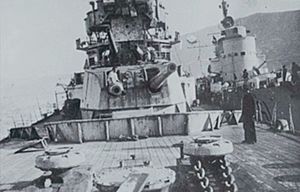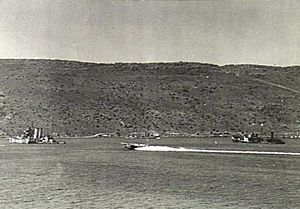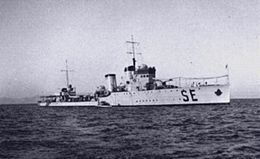Raid on Souda Bay facts for kids
Quick facts for kids Raid on Souda Bay (1941) |
|||||||
|---|---|---|---|---|---|---|---|
| Part of the Battle of the Mediterranean of World War II | |||||||
 HMS York's hull boarded by the Italian torpedo boat Sirio |
|||||||
|
|||||||
| Belligerents | |||||||
| Commanders and leaders | |||||||
| Strength | |||||||
| Fleet in harbour | 2 destroyers 6 motor assault boats |
||||||
| Casualties and losses | |||||||
| 1 heavy cruiser 1 tanker 2 killed |
6 prisoners | ||||||
The Raid on Souda Bay was a surprise attack by the Italian Royal Navy during World War II. It happened in the early hours of March 26, 1941, in Souda Bay, Crete. Italian destroyers launched special explosive motorboats. These small boats managed to get past the harbor defenses. They then attacked the British heavy cruiser HMS York and the Norwegian oil tanker Pericles. Both Allied ships were badly damaged and sank in shallow water. They were eventually lost.
Contents
Why Attack Souda Bay?
Souda Bay is a natural harbor on the northwest coast of Crete. It was a very busy place for Allied ships during the war. The Italian special forces, called the Decima Flottiglia MAS, had chosen it as a target months before. Airplanes had flown over the bay and seen many navy and supply ships anchored there. This made it a perfect target for a secret attack.
The Special Boats for the Attack
On March 25, 1941, two Italian destroyers, Francesco Crispi and Quintino Sella, left the island of Leros. Each destroyer carried three special motor assault boats. These boats were called Motoscafo da Turismo (MT), but they were nicknamed barchino, which means "little boat."
- Each barchino had a powerful 300 kg (660 lb) explosive charge in its front.
- These boats were designed to get through obstacles like torpedo nets.
- The pilot would steer the boat directly at the enemy ship.
- Just before hitting the target, the pilot would jump out of the boat.
- The boat would then crash into the ship, and the explosive charge would blow up.
The Attack Begins
At 11:30 PM, the destroyers released the six barchini about 10 miles (16 km) from Souda Bay. The small boats, led by Lieutenant Luigi Faggioni, entered the bay. They found their targets:
- The heavy cruiser HMS York.
- A large Norwegian oil tanker named Pericles (weighing 8,300 tons).
- Another tanker.
- A cargo ship.
At 4:46 AM, two of the barchini hit HMS York in the middle of the ship. This caused her back boiler rooms and ammunition storage areas to flood. The crew had to steer the ship onto the beach to stop it from sinking completely. Two sailors were killed by the explosions. The Pericles was also badly damaged and settled on the bottom of the bay. Italian reports said the other tanker and cargo ship were also sunk. However, British reports said the other barchini missed their targets, and one even ended up stuck on the beach. The anti-aircraft guns at the base started firing randomly because they thought they were under an air attack.
All six Italian sailors who piloted the boats were captured. Their names were Luigi Faggioni, Alessio de Vito, Emilio Barberi, Angelo Cabrini, Tullio Tedeschi, and Lino Beccati.
What Happened Next?
HMS York was stuck on the beach and couldn't move, but her anti-aircraft guns still helped defend the harbor from air attacks. Later, two divers checking the damage were killed by a bomb that exploded nearby during an air raid. A plan to save the York using a submarine called HMS Rover was stopped because of the intense air attacks. The submarine itself was damaged and had to go back to Egypt.
Before the Battle of Crete (when Germany captured the island), the crew of the York left the ship. They used explosives to destroy her main guns so the Germans couldn't use them. The Pericles was later pulled by other destroyers, but it broke in half and sank on April 14, 1941, during a storm while being towed to Alexandria.
There was a disagreement between the Italian Navy and the German Air Force (Luftwaffe) about who should get credit for sinking HMS York. This was settled by British war records and the ship's own logbook, which Italian naval officers found when they boarded the half-sunk cruiser.
After the war, the hull of HMS York was pulled up and taken to Bari, Italy. It was then taken apart for scrap metal in March 1952.
Images for kids
 | Kyle Baker |
 | Joseph Yoakum |
 | Laura Wheeler Waring |
 | Henry Ossawa Tanner |




